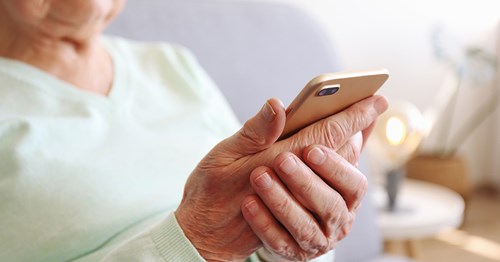Social isolation due to COVID-19 has friends and families left to their own devices…literally. So much so, that grandparents are trying to learn new communication technologies to stay in touch.

People rely on phone calls, text, and video chats more than ever to connect with friends and loved ones during this public health crisis. They interact through long distance catchups, virtual happy hours, and phone calls. But older adults unfamiliar with the different means of communication are at risk for getting lost in the technology shuffle and feeling lonelier than ever.
A recent survey from MedicareAdvantage.com echoed a similar sentiment: Your parents and grandparents want to hear from you more. In fact, nearly 6 in 10 adults over the age of 55 said they wish they would hear from their grandkids more often, and more than 4 in 10 said the same about their adult children. But for others, the social distancing and isolation has encouraged them to step out of their technology comfort zone and learn new forms of communication. In fact, 64 percent of older adults reported using a new technology during the COVID-19 pandemic to communicate with grandchildren or adult children.
RELATED: Social distancing may exacerbate loneliness in older adults, putting their health at serious risk
Social isolation and loneliness can pose serious health risks both physically and mentally. Given the conditions of the current pandemic, older adults are particularly vulnerable. "The frail elderly are particularly at risk because of limited (or impaired) physical mobility, less autonomy, increased vulnerability to infections and immunological depletion, cognitive decline, chronic health conditions, lower injury thresholds and higher recovery times,” Stephanie Cacioppo, director of the Brain Dynamics Laboratory at the University of Chicago’s Pritzker School of Medicine, said in an article published by ABC News.
So, what can help reduce loneliness? Family and friends need to conduct frequent check-ins of their loved ones. Older adults who struggled with isolation prior to the global pandemic especially need to be checked on regularly, according to The Associated Press. It’s important to call them or conduct a video chat to find out how they’re feeling, if they have enough food, and if they need help with anything.
- You can also encourage older adults to help themselves, so they don’t feel so isolated. Urge them to: Maintain a daily routine and schedule. A regular routine is especially important right now, as loneliness commonly manifests as changes in self-care, Ellen Whyte, M.D., a psychiatrist and the director of geriatric psychiatry outpatient services for UPMC Western Psychiatric Hospital, says in the ABC News piece. Individuals should continue to wake at the same time, wear clothes they typically wear, and practice their usual hygiene.
- Attend support programs: Certain Medicare Advantage (MA) plans are offering programs to extend support to individuals and organizations impacted by COVID-19. For example, Aetna’s Resources for Living (RFL) program offers “in-the-moment” phone support to anyone, regardless of whether they are Aetna MA members or not, to help deal with the health crisis, mental health, and community resource referrals, write Aetna executives Christopher Ciano and Cara McNulty in an article for ThinkAdvisor.
- Take advantage of telehealth visits: The Centers for Medicare & Medicaid Services has expanded telehealth services so beneficiaries can receive care from the comfort of their homes. The agency has made more than 80 services available during the crisis.
- Keep fit: A regular fitness routine is especially important to reduce anxiety. Many MA health plans offer virtual fitness benefits, like SilverSneakers, write Ciano and McNulty. Virtual exercise programs are offered on SilverSneakers’ Facebook page and available to anyone with internet access.
